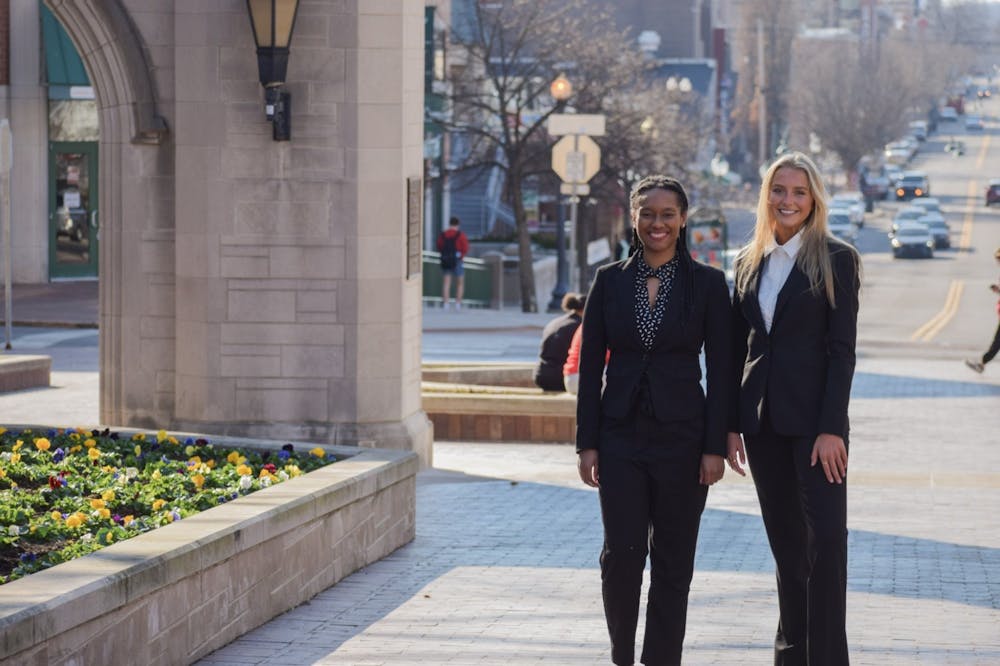The IU Student Government Supreme Court overturned and asked for re-evaluation of three of the IUSG Election Commission’s rulings which found the Inspire campaign responsible for telecommunications violations, the court announced Saturday night.
The overturned violations will be sent back to the commission, where it will re-evaluate and rule again.
The first trial, Inspire IUSG v. IUSG Election Commission, took place Tuesday night. The second trial regarding Inspire’s alleged misuse of IUSG branding will take place Sunday.
Related: [IUSG Supreme Court to hear 6 of Inspire’s appeals]
The court agreed with the commission on one count: complaints 1 and 2 accusing Inspire of sending unsolicited mass text messages were filed properly. The IUSG bylaws require all formal complaints to include the name and university email address of the complainant, the specific alleged violation, the names of the alleged offenders, the date of the alleged violation, the bylaw violated and any evidence.
Neither of the two complaints include the university email address of the complainant and one of the complaints did not mention any individual by name, but instead name the Inspire campaign as the offender.
According to its official ruling, the IUSG Supreme Court found the commission received the complainants’ IU email address when they submitted the complainant. Additionally, the court ruled that Complaint 2 mentions an individual by name because it includes a screenshot of a text message from Inspire Presidential Candidate Dorynn Mentor.
Related: [IUSG Election Commission finds Elevate, Legacy responsible for election violations]
The IUSG Supreme Court ruled in agreement with Inspire for the other three arguments.
First, according to the court’s official ruling, the commission violated Inspire’s due process rights by failing to provide it the opportunity to respond to all evidence. In it’s official ruling, the court said an accused ticket must have the opportunity to respond to all evidence used against them.
Second, the court overturned the commission’s ruling that Inspire failed to grant all requests to opt-out of campaign messaging in a reasonable period of time, according to the court’s official ruling. The IUSG Bylaws state all opt-out requests must be granted but do not establish a specific timeframe.
The Inspire campaign said it aimed to grant all opt-out requests within a 24-hour period, according to the court’s official ruling. However, the commission determined the acceptable amount of time to grant an opt-out request is within eight hours. According to the court, the election commission did not tell campaigns about the eight hour deadline until it was used against Inspire. In its official ruling, the court found Inspire cannot be punished for a rule it was not aware of.
Related: [IUSG Election Commision finds Inspire responsible for two more violations]
Third, the court ruled the commission should not have found Inspire responsible for a Class A violation, according to the court’s official ruling. IUSG Bylaws state if a ticket is found responsible for a Class A violation it loses 10 points and is automatically disqualified from the election.
The commission found Inspire responsible for a Class A violation when it said Inspire’s campaign text messages sent to over 10,000 individuals violated the bylaws by failing to offer a clear way to opt-out. According to the bylaws, any election violation involving over 5,000 students is a Class A violation.
Inspire received the contact information of over 10,000 individuals through a petition circulated by the 2020 Inspire ticket and over 12,000 individuals through a petition circulated by the 2021 Inspire ticket. According to the court’s official ruling, the commission took issue with contact information obtained from the 2020 Inspire ticket’s petition because those individuals did not opt-in to messaging from the 2021 Inspire ticket.
In the court’s official ruling, the court removed duplicate names of the two lists of contact information and submitted the second list of contact information to IU to verify how many individuals are current students. According to the court’s official ruling, the list consists of 4,732 students and does not constitute a Class A violation.
Another trial, Andrew Ireland v. IUSG Election Commission, took place Tuesday. Ireland, Inspire’s campaign manager, argued that the commission should not have dismissed Inspire’s complaint claiming Elevate did not receive the 150 signatures required to run for IUSG executive office, according to the court’s official ruling.
The court did not accept any of Ireland’s arguments because the commission already conducted an investigation, the court said in its official ruling.




